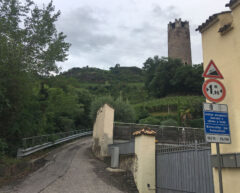This page contains information about the 2018 Transcontinental Race No6. See the Overview page for a general introduction to the Transcontinental Race (TCR). See also the official TCR page.

Page Contents:
Route Overview
For the fourth consecutive year, the race started in Geraardsbergen, Belgium with a short loop around the town and then an ascent of the cobbled climb, the Muur van Geraardsbergen. My video from the start of the 2015 TCR is below:
After the first two editions of the TCR started on Saturday morning in London, UK, and the next three on Friday evening/night in Geraardsbergen, Belgium, this edition started on Sunday evening, at 22:00 on Sunday, July 29th. It’s unclear what was the main motivation for this change.
The finish was also the same as the previous year, in Kalabaka, Greece, near the Meteora monasteries, with the final parcours passing the monasteries that stand on pinnacles of rock above the town.
Despite the start and finish being in the same locations, all four checkpoints were in countries that hadn’t had a checkpoint in any previous edition. The simplified map of the route is below.
The first checkpoint was in the Austrian Alps, the Bielerhöhe Pass. The pass is over 2,000 meters elevation and is on the Rhine-Danube watershed. The upper part of the pass is a toll road and there is a shorter route with a lower pass nearby that most of the traffic takes, so it is mostly quiet.
The second checkpoint started on the highest road in Slovenia, at Mangart Sedlo and the parcours descended from the summit down into the Soča Valley before climbing the Vrśić Pass.
Similar to Transcontinental Race No. 5, 2017, riders had to head north between CP2 and CP3, going all the way up to the most northern checkpoint to be used by the TCR (bearing in mind that London, UK, is further north but was used as the start for Transcontinental Race No. 1, 2013 and Transcontinental Race No. 2, 2014). Riders had to cross into Poland before ascending the unpaved Karkonosze Pass and descending back into Czechia.
CP4 was the Bjelašnica mountain above Sarajevo, where some of the 1984 Winter Olympics events were held. The upper section of the climb was reported to be extremely steep and rough gravel/dirt/rocks, so a lot of it was unrideable.
The Bjelašnica mountain was used by the military during the Bosnian War, so this marked the second time that the race visited a site that was important during that war because Transcontinental Race No. 3, 2015 visited Vukovar, Croatia, where a lot of fighting occurred.
The typical total distance ridden was similar to the previous two years at almost 4,000 km, but the finish party was one day later, at the end of the 16th day. Below is the simplified map of the route. Visit TrackLeaders to see the actual rider’s routes.
Results Highlights
222 solo riders started plus 14 pairs for 250 people total.
Solo Riders
James Hayden (GBR) had won the previous edition of the race, with Björn Lenhard (DEU) in 2nd, so they were the pre-race favorites.
It was actually Bernd Paul (DEU) who was 1st at CP1, which is something that he’d done in 2015, but then had to stop due to medical problems. This time he made it to CP2 in 3rd, but then had to scratch.
Björn Lenhard was slightly ahead of James Hayden at CP1, in 3rd and 4th places. By CP2 the order was the same, but they were now 1st and 2nd. By CP3, James had taken the lead and stayed there the rest of the way. He finished in just under 9 days, 24 hours ahead of a close fight for 2nd place.
It was Stephane Ouaja (FRA) who was 2nd at CP1, who is another multi-time veteran of the race. He dropped back to 5th at CP2 then up to 3rd at CP3. Before CP4, he re-passed Björn and arrived at CP4 in 2nd place, about 30 minutes ahead of Björn. Unfortunately, he had major problems with a puncture that he couldn’t fix between CP4 and the finish and lost about 24 hours to his rivals. He finished in 12th, but received 12.5 hours of penalties, which dropped him further down to 15th.
Matthew Falconer (GBR) arrived at CP1 in 5th, but then had two slow segments to CP2 and CP3, where he was in 11th. He then found another gear and had the fastest segment time CP3-4 to move back up to 6th, then continued his pace to the finish and passed Björn for second place.
Björn had several problems during the race, which included doing an extra 160 km in Bosnia when he tried to take a direct route but discovered after a long way up the valley that the road over the mountain had been closed for 20 years, and so he had to back-track and find a different route. Björn finished in 3rd, only 1.5 hours after Matthew, but after penalties were applied, the difference was only 54 minutes.
Alexandre Le Roux (FRA) started steadily, being 16th at CP and was still only 12th at CP3, but had the 2nd best time for the second half, which moved him up to 4th place at the finish, only one hour behind Björn.
Josh Cunningham (GBR) had a similar race pattern as Alexandre, being 13th at CP3 before a fast second half brought him up to 6th at the finish, which was 5th after penalties were added. He had problems in the CP1-2 segment, being about 10 hours slower than the others in the Top 10.
René Bonn stayed between 5th and 9th place throughout the race and was the only person to finish in the top 5 whose position was affected by penalties. His 3 hours of penalties put him 20 minutes behind Josh, so he was classified 6th.
Mohamed El Alami (MOR) received the largest amount of total penalties so far in the TCR without being disqualified, which was a total of 15 hours 15 minutes. That changed his 8th place at the finish to 13th place after penalties. 7 riders and 1 pair received a total of at least 12 hours of penalties, so I expect the 12 hours was for a specific infraction that they all made, plus they each received between 30 minutes and 3h15m in addition to that.
105 solo riders achieved a placed in the General Classification, for which the riders had to reach all checkpoints and the finish within the deadline (under 17 days) and have no major infractions. A further 30 riders were classified as “Finishers”, two of whom reached the finish and CPs within the time limits but were not awarded a GC position for other reasons. One rider was disqualified.
Of the 86 solo riders who scratched, 14 did so before CP1, 21 more before CP2, 35 more before CP3, but then only 15 more in the second half of the race (13 before CP4 and 2 between CP4 and the Finish).
Women
13 solo women started the race, 5 of whom were classified in the GC, 4 more finished and 4 scratched. 8 other women started as part of pairs, 5 of whom finished in the pairs GC.
Ede Harrison (GBR) was the first woman at each CP and finished in under 14 days. She was about 15 hours ahead of the second woman, Anisa Aubin (GBR), and Karolina Maciejewska (Pol) was in 3rd, a further 12 hours behind.
Pairs
9 of the 14 pairs were classified in the GC and 4 pairs scratched.
Jonathan Rankin (GBR) & James Craven (GBR) were the first pair to reach CP1 and CP2, where they arrived after only 9 solo riders and 32 hours ahead of the 2nd pair. James got sick when approaching CP3 and had to rest at a hotel and eventually went to a hospital. They decided that Jonathan should continue alone and when he reached the finish he was still in 10th place among the solo riders.
After stopping for 2 days, James decided he felt good enough to continue and he reached the finish in under 14 days. Although they were each awarded a Finish, they couldn’t be classified in either of the pair or solo categories. Both Jonathan and James were interviewed at CP3 in this podcast.
Such situations have occurred before in the TCR, but this one is interesting because despite the lost time, James still finished 3 hours ahead of the first complete pair, and 15 hours ahead after penalties were added. We don’t know if Jonathan and James would have received any penalties if they had been in the GC (Finishers don’t receive penalties because there is no ranking), but it does appear that they could have won the pairs category if Jonathan had waited for his partner. However, they were jointly awarded the Spirit of the Race award.
Before CP3, Nico Deportago-Cabrera (USA) & Charles Christiansen (USA) inherited the lead in the pairs category due to Jonathan and Charles splitting up. They maintained their position and reached the finish about 12 hours ahead of the next pair, Luca Somm (CHE) & Oliver Bieri (CHE). However, Nico & Charles received 13 hours of penalties (probably another instance of the same 12-hour penalty that 7 solo riders also received, plus an additional smaller infraction).
It was therefore the Swiss pair that were officially the winning pair. They had been the 5th pair at CP1 but had the fastest time of any pair for the second half of the race, CP3-Finish.
Anton Lindberg (SWE) & Amy Lippe (USA) were the third pair. They had been 6 hours behind Rachel Batt (GRB) & Jim Stewart (GBR) at CP3 but went past them before CP4. The all-female pair of Johanna Jahnke (DEU) & Marion Dziwnik (DEU) also passed Rachel & Jim towards the end of the race to finish as the 4th pair, with Rachel & Jim in 5th.
Media Coverage
There were 6 official podcasts covering the race:
- The Beginning
- The Road to the Control
- Interview with Winner James Hayden at the Finish Line
- Moments of Despair
- In Conversation – Martin Temmen, Matthew Falconer, René Bonn, Chris Thomas
- Ending
Last significant page update: February, 2023
This page is in the The Transcontinental Race section. The next page in this section is:

